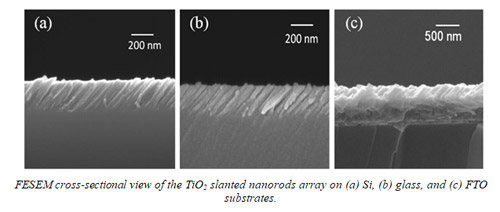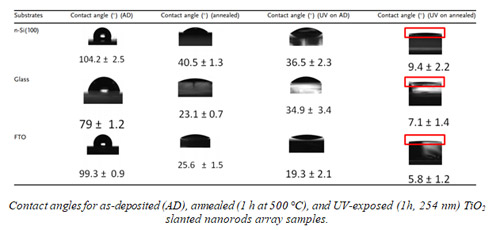 Cleaning and maintenance of surfaces for automobiles, smart windows, solar cells and such devices is both cumbersome and costly. Besides, irregular and improper cleaning may lead to rapid fall in the efficiency of systems. Scientists are trying to resolve this with the help of innovative materials that can form efficient self-cleaning surfaces.
Cleaning and maintenance of surfaces for automobiles, smart windows, solar cells and such devices is both cumbersome and costly. Besides, irregular and improper cleaning may lead to rapid fall in the efficiency of systems. Scientists are trying to resolve this with the help of innovative materials that can form efficient self-cleaning surfaces.Centre for Nano and Soft Matter Sciences (CeNS) Bangalore has developed titanium dioxide slanted nanorods array based self-cleaning surfaces by employing glancing angle deposition (GLAD) technique. GLAD is an oblique angle deposition in which the substrate inclination is manipulated during the film deposition. Self-cleaning property saves extra money to be spent on maintenance of active surfaces.
 Dr. S Angappane and his team have investigated slanted titanium dioxide array grown by GLAD technique using e-beam evaporation on silicon, fluorine-doped tin oxide, and glass substrates having different degree of roughness. The team show the control over growth of slanted nanorods and its distribution over substrates. The surface roughness which basically defines the wettability state of any surface in addition to surface energy was controlled by GLAD. It is observed that the as–deposited samples show both hydrophobic and hydrophilic states. Heating at 500 °C for 1 h has increased the surface energy and transformed all the samples to hydrophilic. UV irradiation (1 h) further escalated the hydrophilicity and transformed all the samples into a superhydrophilic state, a self-cleaning state. The study shows that the surface energy change was best for the TiO2 slanted nanorods array having more surface roughness.
Dr. S Angappane and his team have investigated slanted titanium dioxide array grown by GLAD technique using e-beam evaporation on silicon, fluorine-doped tin oxide, and glass substrates having different degree of roughness. The team show the control over growth of slanted nanorods and its distribution over substrates. The surface roughness which basically defines the wettability state of any surface in addition to surface energy was controlled by GLAD. It is observed that the as–deposited samples show both hydrophobic and hydrophilic states. Heating at 500 °C for 1 h has increased the surface energy and transformed all the samples to hydrophilic. UV irradiation (1 h) further escalated the hydrophilicity and transformed all the samples into a superhydrophilic state, a self-cleaning state. The study shows that the surface energy change was best for the TiO2 slanted nanorods array having more surface roughness.The team is further working on making substrates self-cleaning without any external stimuli which can find applications in field of automobiles, smart doors/windows, textile, solar cells and energy sectors etc.
Publication: Structural Properties and Wettability of TiO2 Nanorods, Gaurav Shukla, Chandan Kumar, and Subramanian Angappane, Phys. Status Solidi B (2019), 1900032 (DOI: 10.1002/pssb.201900032).
For more details, please contact Dr. S. Angappane (Email: angappane[at]cens[dot]res[dot]in).






























